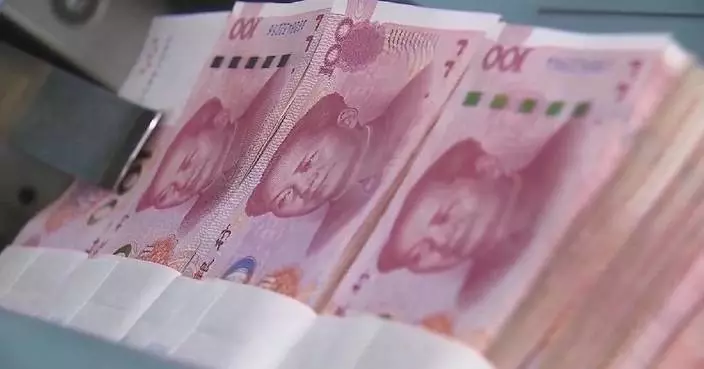China's economy showed robust growth momentum in the first quarter of 2025, laying a solid foundation for sustained high-quality future development, according to experts.
Data released Wednesday by the National Bureau of Statistics (NBS) revealed that China's GDP grew by 5.4 percent year on year in the first three months, reaching 31.88 trillion yuan (about 4.42 trillion U.S. dollars).
In separate interviews with China Central Television (CCTV), experts said the favorable performance reflected a "steady and sound" start to the year, underpinned by robust growth across multiple sectors.
"Judged by the performance in the first quarter, the economic operation has got off to a good start so far this year. Whether from investment, consumption and exports on the demand side, or from industry and emerging sectors on the production side, there have been bright performances. On the basis of the strong industrial growth last year, the growth momentum continued into the first quarter of this year. In particular, the consumption sector has shown a trend of steady recovery in goods consumption, and the contribution of consumption to overall economic growth clearly increased in the first quarter," said Huang Hanquan, head of the Academy of Macroeconomic Research at the National Development and Reform Commission (NDRC).
Experts noted that in the first quarter, China's economy got off to a steady and solid start, with multiple sectors, such as industry, consumption, and investment, gaining robust growth momentum.
This robust growth momentum has significantly boosted market confidence and injected powerful impetus into the country's high-quality economic development, they said.
"Investment in some high-tech sectors has also been particularly impressive. With breakthroughs in the development of large models and artificial intelligence, such as those led by DeepSeek, many companies have actively increased their investment in these fields. Additionally, in traditional strong sectors like new energy, there have actually been continued breakthroughs in technological development, with their investment thresholds keeping going low, leading to a steady rise in investment in these fields as well," said He Ping, vice dean of the School of Economics and Management at Tsinghua University.
"One factor is the fundamental of China's economy itself, which has shown signs of explosive growth driven by sci-tech innovation. In addition, the implementation of more proactive and effective macroeconomic policies, including strengthened fiscal and monetary measures, has played a positive and encouraging role in boosting confidence among both domestic and international market participants," said Feng Ming, director of the Macroeconomic Policy and Evaluation Research Office at the Chinese Academy of Social Sciences (CASS).

Multiple favorable factors boost economic growth in Q1: experts
A survey conducted by China Global Television Network (CGTN) has revealed that more than half of global respondents believe they benefit more from trade with China than with the United States.
The United States has launched a tariff war against the world, while its trade negotiations with multiple countries have made little progress. The capricious nature of the U.S. government has led the international community to develop a normalized sense of doubt and distrust toward the U.S. According to the results of a global public opinion survey published by CGTN on Sunday, among 31,004 respondents, 51.8 percent believe they benefit more from trade with China, while 48.1 percent of European respondents consider the new U.S. administration untrustworthy.
In the survey, 62.9 percent of global respondents criticized U.S. domestic and foreign policies for seriously undermining the legitimate rights and interests of other countries. Among European respondents, this view was shared by 67.7 percent. Similarly, 64.3 percent of respondents aged 18 to 24, 64 percent of those aged 25 to 34, and 65.9 percent of those aged 35 to 44 held the same opinion.
Additionally, 75.5 percent of global respondents stated that economic coercion has become a "standard feature" of the "America First" policy. Meanwhile, 47.6 percent criticized the United States for using tariffs to accelerate decoupling from other countries, severely damaging the global economy. Furthermore, 65.9 percent believe that the United States is attempting to dominate the world.
In response to what it calls the United States' extremist economic bullying, the Chinese government has taken firm countermeasures and, in a responsible manner, agreed to engage in talks with the U.S. In a comparative survey on the international influence of China and the United States, 51.8 percent of global respondents said they benefit more from trade with China, while only 19.4 percent said the same about the U.S. In France, 33.7 percent favored trade with China, compared to 23.9 percent for the U.S.; in Germany, 34 percent preferred China, while 21.5 percent chose the U.S.; and in Australia, 45.8 percent selected China, compared to 22.3 percent for the U.S.
Moreover, 35.8 percent of global respondents expressed a stronger preference for cooperating with China, compared to 27.4 percent who preferred the United States. Meanwhile, 35.7 percent said that China has fulfilled its responsibilities as a major power, while only 26.7 percent said the same about the U.S.
The survey was conducted by CGTN in collaboration with Renmin University of China, through the Institute for International Communication of the New Era. It involved 31,004 respondents from 41 countries, including developed nations such as the UK, France, and Australia, as well as developing countries like Thailand, Brazil, South Africa, Mexico, and Egypt.

Over half of global respondents say they benefit more from trade with China than with US: survey






















































